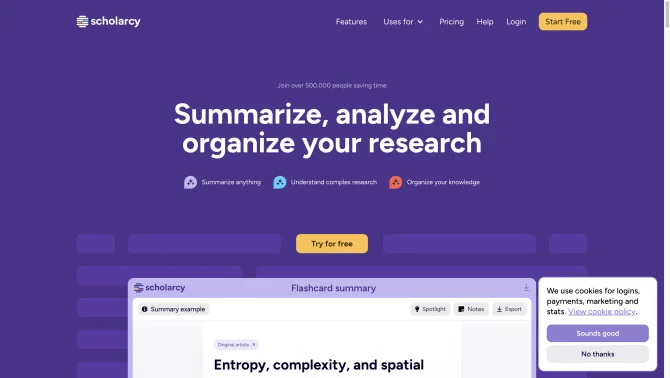Introduction
Scholarcy is an innovative AI tool that streamlines the process of understanding lengthy academic papers and reports. By utilizing advanced summarization algorithms, it breaks down dense content into easily digestible flashcards, allowing users to quickly grasp the essence of a document. The tool is particularly beneficial for researchers, students, and professionals looking to stay updated with the latest findings in their field without spending excessive time on reading full-length articles.
background
Developed with the aim to democratize access to academic research, Scholarcy has positioned itself as a valuable asset in the educational and professional spheres. The company's commitment to continuous improvement ensures that the tool remains at the forefront of AI summarization technology, adapting to the evolving needs of its user base.
Features of Scholarcy
Automatic Summarization
Scholarcy's AI automatically generates summaries of uploaded documents, saving users the time of manual reading.
Flashcard Format
Summaries are presented in a flashcard format, ideal for quick review and learning.
Customizable Summaries
Users can adjust the level of detail in summaries to suit their needs.
Multi-Document Support
The tool can process multiple documents simultaneously, providing a comprehensive overview of a research topic.
Integration with Research Workflow
Scholarcy can be integrated into existing research workflows, enhancing productivity.
How to use Scholarcy?
To use Scholarcy, simply upload your document, select the desired summary length, and let the AI do the work. The generated flashcards can then be reviewed, downloaded, or shared with others.
Innovative Features of Scholarcy
Scholarcy's innovation lies in its ability to distill complex information into simple, understandable summaries without losing the core message, making it an indispensable tool for knowledge seekers.
FAQ about Scholarcy
- What types of documents can I summarize with Scholarcy?
- Scholarcy supports a wide range of document formats including PDFs, Word documents, and online articles.
- How long does it take to generate a summary?
- Summaries are generated in real-time, with the exact time depending on the length and complexity of the document.
- Can I edit the summaries generated by Scholarcy?
- Yes, users can edit the summaries to ensure they fully capture the intended meaning.
- Is Scholarcy suitable for academic research?
- Absolutely, Scholarcy is designed to support academic research by providing quick insights into research papers.
- Can I use Scholarcy for commercial purposes?
- Scholarcy's terms of service should be reviewed for specific use cases, but it is generally intended for personal and educational use.
- What is the pricing structure for Scholarcy?
- Pricing details are available on the Scholarcy website, with a freemium model offering basic services for free.
Usage Scenarios of Scholarcy
Academic Research
Scholarcy simplifies the literature review process by providing concise summaries of research papers.
Market Analysis
Use Scholarcy to quickly understand market reports and stay ahead of business trends.
Education
Instructors can use Scholarcy to prepare course materials or to help students grasp complex concepts.
Professional Development
Professionals can leverage Scholarcy to keep up with industry research and developments.
User Feedback
Scholarcy has been a game-changer for my research process, allowing me to quickly grasp the key points of lengthy papers.
The flashcard feature is incredibly useful for revising and remembering the summaries I generate.
As a busy professional, I appreciate how Scholarcy saves me hours of reading time each week.
The interface is user-friendly, and the summaries are consistently accurate and insightful.
others
Scholarcy's commitment to making research accessible has not gone unnoticed. It has been praised for its ability to handle a wide array of document types and for its potential to revolutionize the way we approach academic reading.
Useful Links
Below are the product-related links, I hope they are helpful to you.
